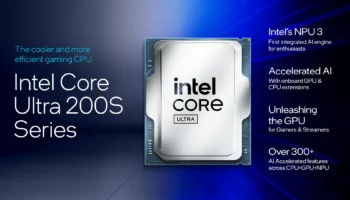Intel has significantly changed its product and process development strategy in the last few years. The chipmaker is promising the release of five advanced process nodes in the next four years. The 20A node (the equivalent of TSMC’s 2nm) is slated to regain process parity sometime in 2024, followed by “unquestioned leadership” in 2025, courtesy of the 18A node. Each of these nodes will be accompanied by a new generation of Core processors, which we’ll revisit in this post:

Intel launched the 13th Gen Core family for desktops and notebooks in the fall of 2022. Essentially Alder Lake on steroids, it features higher core counts and a larger L2 cache for an ample boost in gaming and content creation performance. Like the 10nm node, the transition to the Intel 4 process will take different routes for the PC and notebook segments.
And by different, I mean another refresh for the desktop crowd, leaving Meteor Lake for the higher-end notebook segment. The Raptor Lake-S Refresh is expected to roll out as the 14th Gen Core family sometime this fall. In parallel, Meteor Lake-P will power the next generation of premium notebooks. The lower-end mobile chips and the HX series gaming family will retain the Raptor Lake architecture.
The true next-generation processors for desktop users will release in late 2024 in the form of Arrow Lake-S. These chips are expected to further increase E-core counts, with some reports claiming up to 32 E and 8 P-cores for the flagship. Arrow Lake will leverage the 20A node for the compute die and TSMC’s N3 node for the iGPU tile.
According to rumors, the 15th Gen Core mobile (Core 2nd Gen) processors will be a Meteor Lake-P refresh, while the Ultra series may be fabbed on TSMC’s 3nm process to relieve 20A capacity woes. And then there’s Lunar Lake. This is supposed to be the lineup that puts Intel back in the lead with its 18A node.
Not much is known about Lunar Lake besides that it’ll leverage an advanced chiplet architecture with Foveros 3D stacking. It’s a mobile-first architecture designed from the ground up for all-day battery life and extreme power efficiency. And there’s a chance that it may see a delayed launch on the desktop platform.
Further reading about Intel’s 14th Gen Core processors:
- 40 Core Intel 15th Gen Flagship May Be Canceled, Mobile CPUs May Leverage TSMC 3nm Process [Report].
- Intel 14th Gen Meteor Lake CPU with 128MB of L4 Cache Leaks Out.
- Intel 14th Gen Meteor Lake CPUs (Intel 4) in Production: 20A (2nm) Arrow and Lunar Lake in 2024.





